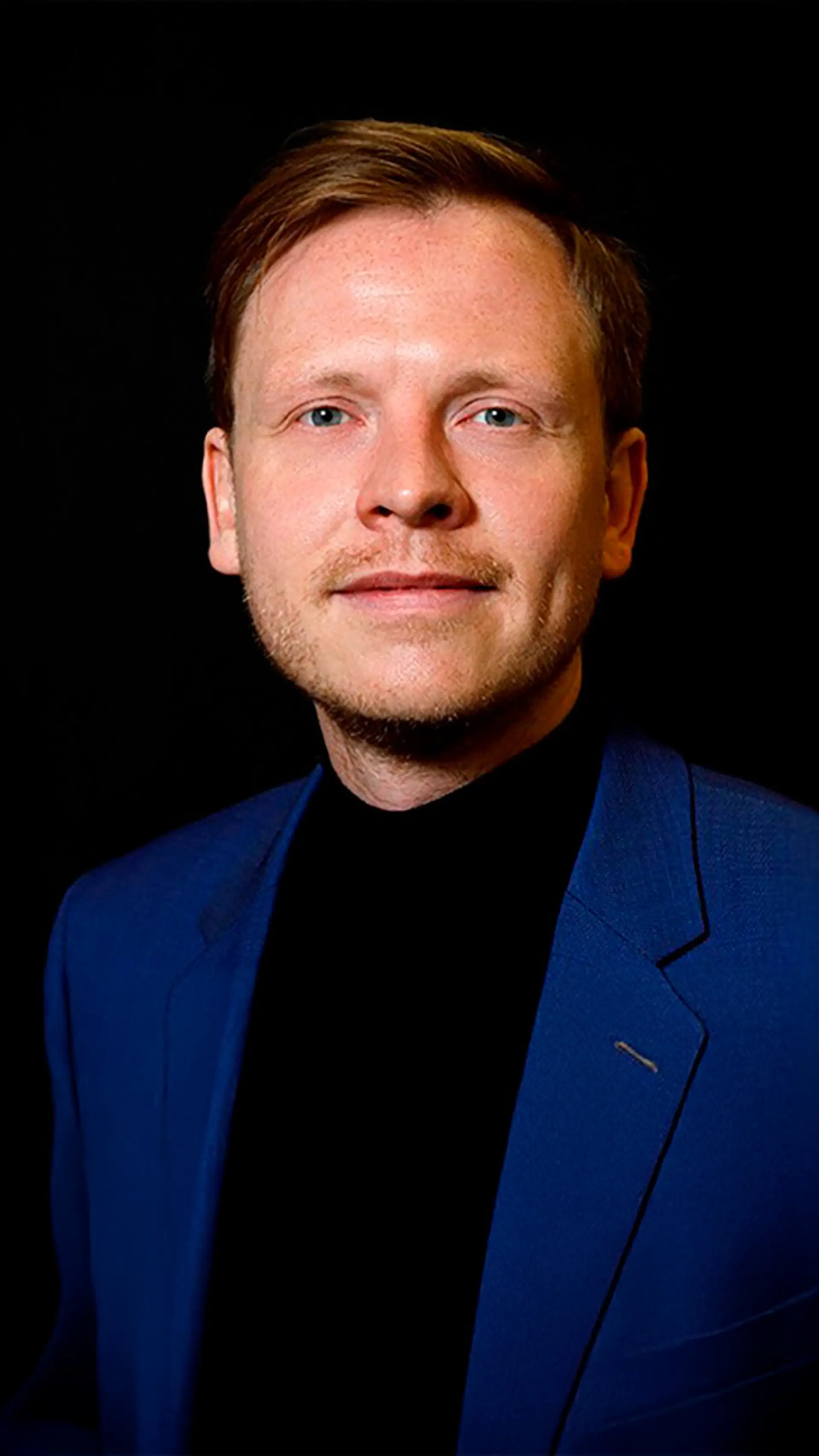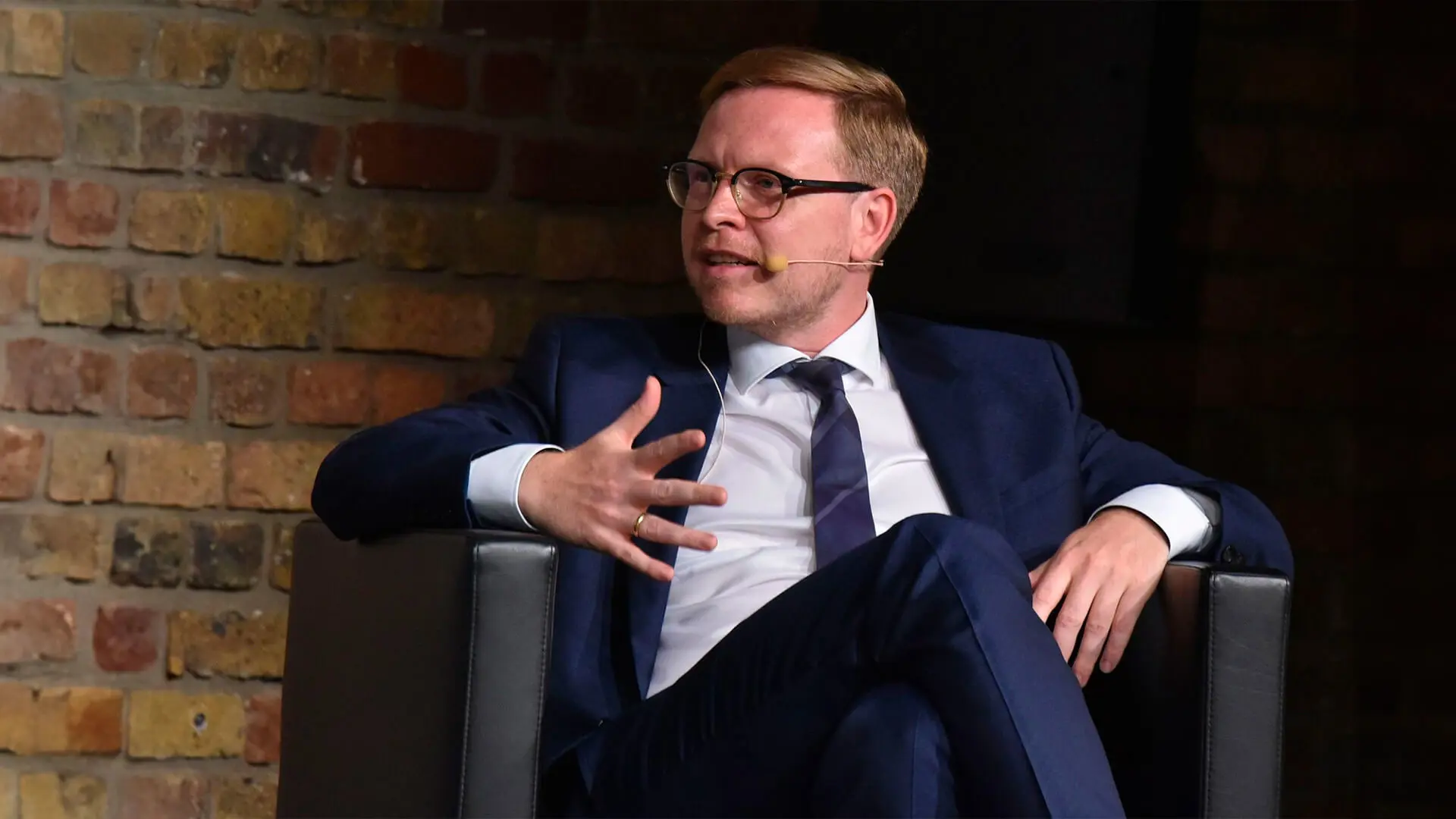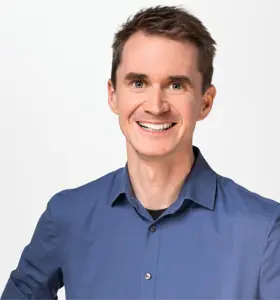

Modern and Contemporary Philosophy Professor, Thought Leader, Researcher, Policy Advisor & Bestselling Author
Non-binding request for Dr. Markus Gabriel
Contemporary Ethics and Enlightenment
Speaker Dr. Markus Gabriel is a philosophy professor who discusses questions about current developments in society and the economy from the perspective of ethics. Markus combines profound thoughts on the meaning of being with current events and modern technology.
Why you should book speaker Dr. Markus Gabriel
The professor of philosophy questions the ethics of the present and stimulates informed debates and discussions with his lectures.
In his lectures, he encourages the audience to ask the right questions to understand the world better.
He conveys his insights in a comprehensible and vivid way in companies - always at eye level with the audience.
Speaker Dr. Markus Gabriel proves that philosophy can be very lively and has nothing to do with dusty books by the ancient Greeks. And this, although he habilitated on skepticism and idealism in antiquity. The youngest German professor in his subject is more concerned with the present and the future. Modern society in the 21st century raises new questions about meaning.
Technical developments push the limits of what is ethically and morally responsible. Gabriel takes up these profound thoughts and discusses them passionately with his audience and students. With buzzwords like nano-robots, artificial intelligence, and virtual reality, we rarely think about the impact on our ethical perception. This is exactly where Dr. Markus Gabriel comes in: he looks behind the facades of technical innovations. In his bestseller “Der Sinn des Denkens” (The Sense of Thinking), he deals with the increasing digitalization.
The question of whether artificial intelligence can think like humans and understand ethics is at the top of the list. Gabriel asks more questions than he gives answers - the latter he demands from his listeners and readers. As a representative of philosophical realism, he wants to analyze contemporary thinking. He has taught in New York and at the Sorbonne, among other places. Today he directs the International Centre for Philosophy in North Rhine-Westphalia. At the Center for Science and Thoughts, Gabriel connects the natural sciences with the topics of philosophy.
In his book “Why the World Does Not Exist,” the philosopher succeeded in presenting his thoughts to a broad audience at a high level. In the process, critics attest that a broad section of the population understands it. Gabriel is considered one of Germany's most important thought leaders and is accordingly often invited for interviews and talk shows. His lecture topics also include ethics and economics, as well as “Can robots be conscious?”
The professor of philosophy questions the ethics of the present and stimulates informed debates and discussions with his lectures.
In his lectures, he encourages the audience to ask the right questions to understand the world better.
He conveys his insights in a comprehensible and vivid way in companies - always at eye level with the audience.
Speaker Dr. Markus Gabriel proves that philosophy can be very lively and has nothing to do with dusty books by the ancient Greeks. And this, although he habilitated on skepticism and idealism in antiquity. The youngest German professor in his subject is more concerned with the present and the future. Modern society in the 21st century raises new questions about meaning.
Technical developments push the limits of what is ethically and morally responsible. Gabriel takes up these profound thoughts and discusses them passionately with his audience and students. With buzzwords like nano-robots, artificial intelligence, and virtual reality, we rarely think about the impact on our ethical perception. This is exactly where Dr. Markus Gabriel comes in: he looks behind the facades of technical innovations. In his bestseller “Der Sinn des Denkens” (The Sense of Thinking), he deals with the increasing digitalization.
The question of whether artificial intelligence can think like humans and understand ethics is at the top of the list. Gabriel asks more questions than he gives answers - the latter he demands from his listeners and readers. As a representative of philosophical realism, he wants to analyze contemporary thinking. He has taught in New York and at the Sorbonne, among other places. Today he directs the International Centre for Philosophy in North Rhine-Westphalia. At the Center for Science and Thoughts, Gabriel connects the natural sciences with the topics of philosophy.
In his book “Why the World Does Not Exist,” the philosopher succeeded in presenting his thoughts to a broad audience at a high level. In the process, critics attest that a broad section of the population understands it. Gabriel is considered one of Germany's most important thought leaders and is accordingly often invited for interviews and talk shows. His lecture topics also include ethics and economics, as well as “Can robots be conscious?”

Keynotes
Keynote by speaker Dr. Markus Gabriel:
Moral Progress in Dark Times - For a New Enlightenment!
The Corona pandemic at the latest has shown that the challenges of the 21st century are all global in
their essence and can thus only be met through new formats of cosmopolitan cooperation.
This lecture shows what the discipline of ethics is all about and how a new kind of ethics, which assumes that moral questions have real answers, is able to substitute cooperation for unleashed competition.
Audience takeaway:
Introduction to ethics and shows that ethics in the 21st
century answers concrete questions of humanity and does not hinder us socially and economically, but
moves us forward.
their essence and can thus only be met through new formats of cosmopolitan cooperation.
This lecture shows what the discipline of ethics is all about and how a new kind of ethics, which assumes that moral questions have real answers, is able to substitute cooperation for unleashed competition.
Audience takeaway:
Introduction to ethics and shows that ethics in the 21st
century answers concrete questions of humanity and does not hinder us socially and economically, but
moves us forward.
Keynote by speaker Dr. Markus Gabriel:
Why do we need an ethics of A.I.?
Artificial intelligence has recently penetrated our everyday lives and workplaces, unleashing unimagined disruptive potential.
For this reason, governments, companies and technology experts are calling for the development of ethical guidelines for a humane and trustworthy use of A.I..
Audience takeaways:
Markus Gabriel develops the basic ideas of a new ethics of A.I., which allows not only dangers and risks, but above all positive prospects for a desirable A.I. to be developed.
For this reason, governments, companies and technology experts are calling for the development of ethical guidelines for a humane and trustworthy use of A.I..
Audience takeaways:
Markus Gabriel develops the basic ideas of a new ethics of A.I., which allows not only dangers and risks, but above all positive prospects for a desirable A.I. to be developed.
Keynote by speaker Dr. Markus Gabriel:
What is that actually, an A.I.?
● The increasing use of A.I. systems are also driving the ever more rapid digitalization of all social conditions. For many people, this raises the question of how we recognize A.I. systems and whether they will possibly even surpass humans in all important questions of fact, knowledge and life in the same way
that they have long since beaten us in chess or Go.
Audience takeaway:
A.I. systems are in reality not intelligent in themselves, but only in the context of human-machine interaction. In this way, they have the potential to make us more intelligent, but this requires that we get a more accurate picture, comprehensible to all, of what our, biologically-based existence consists of.
that they have long since beaten us in chess or Go.
Audience takeaway:
A.I. systems are in reality not intelligent in themselves, but only in the context of human-machine interaction. In this way, they have the potential to make us more intelligent, but this requires that we get a more accurate picture, comprehensible to all, of what our, biologically-based existence consists of.
Keynote by speaker Markus Gabriel:
The Virologic Imperative
What measures to contain the pandemic are ethically justified? - Moral progress in the Corona crisis - The post-coronial future.
Audience takeaway:
Why now is the time to start a new global enlightenment Ethics and morality in society and the economy Digitalisation Artificial Intelligence Can robots think or be conscious? Philosophical foundations of ethics Consciousness research
Audience takeaway:
Why now is the time to start a new global enlightenment Ethics and morality in society and the economy Digitalisation Artificial Intelligence Can robots think or be conscious? Philosophical foundations of ethics Consciousness research
Keynote by speaker Dr. Markus Gabriel:
Why the world does not exist
Markus Gabriel developed the principles of a radical new philosophy, New Realism.
These are based on a demonstration that there is no such thing as the one, all-encompassing world in which all things are interconnected. Therefore, it is never possible to know and make controllable nature, reality, the universe as a whole; a world formula will not be found.
Instead, we have to recognize that reality is manifold in itself, that there is always more complexity than
we take into account.
Audience takeaway:
On the basis of this new philosophy, Gabriel shows with wit and concrete examples how we can lead a
liberated life in the face of this insight.
These are based on a demonstration that there is no such thing as the one, all-encompassing world in which all things are interconnected. Therefore, it is never possible to know and make controllable nature, reality, the universe as a whole; a world formula will not be found.
Instead, we have to recognize that reality is manifold in itself, that there is always more complexity than
we take into account.
Audience takeaway:
On the basis of this new philosophy, Gabriel shows with wit and concrete examples how we can lead a
liberated life in the face of this insight.
Keynote by speaker Dr. Markus Gabriel:
I is not brain - Man as a spiritual living being
There is often the view that our consciousness, our spirit, is ultimately nothing more than a kind of neuron storm that can at some point be fully explored and explained with the methods of the natural sciences.
Markus Gabriel, on the other hand, shows in his lecture that we are spiritual living beings whose spirit reaches far beyond our own organism.
In his view, consciousness does not sit under the top of our skulls, but extends into reality.
Audience takeaway:
In Dr. Gabriel's view, consciousness does not sit under the top of our skulls, but extends into reality, that is why we can actually recognize it more or less as it is and are not prisoners of our own brain, as some neuroscientists keep claiming.
Markus Gabriel, on the other hand, shows in his lecture that we are spiritual living beings whose spirit reaches far beyond our own organism.
In his view, consciousness does not sit under the top of our skulls, but extends into reality.
Audience takeaway:
In Dr. Gabriel's view, consciousness does not sit under the top of our skulls, but extends into reality, that is why we can actually recognize it more or less as it is and are not prisoners of our own brain, as some neuroscientists keep claiming.
Keynote by speaker Dr. Markus Gabriel:
Why free will really exists and we are not machines
In modern times, it has been repeatedly denied that we humans have free will, first by physics, then by neuroscience and most recently by A.I. research, which assumes that we are ultimately completely transparent and controllable by algorithms.
In contrast, Markus Gabriel shows on the basis of his international bestsellers that we do indeed have free will, which is fully compatible with the fact that natural laws apply wherever we can act.
Audience takeaway:
The universe as a physically describable system is a necessary prerequisite of free will, but is in no way opposed to it, because as free spiritual living beings we are not machines that could be understood without free will.
In contrast, Markus Gabriel shows on the basis of his international bestsellers that we do indeed have free will, which is fully compatible with the fact that natural laws apply wherever we can act.
Audience takeaway:
The universe as a physically describable system is a necessary prerequisite of free will, but is in no way opposed to it, because as free spiritual living beings we are not machines that could be understood without free will.


